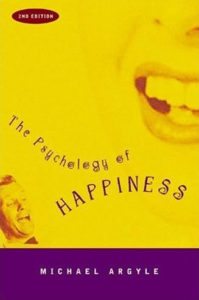 What is happiness? Why are some people happier than others? This new edition of The Psychology of Happiness provides a comprehensive and up-to-date account of research into the nature of happiness. Major research developments have occurred since publication of the first edition in 1987 - here they are brought together, often with surprising conclusions. The book draws extensively on research from the disciplines of sociology, physiology and economics as well as psychology. Michael Argyle also explores the nature of positive and negative emotions, and the psychological and cognitive processes that are involved. The Psychology of Happiness examines the key issues that have been studied and are said to have a bearing on one’s happiness quotient. These include: the effect of friendship, marriage and how other relationships impact on one’s emotional state. Also explored are the effects of work, employment, leisure, money, class and education. The importance of individual personality traits such as optimism, purpose in life, internal control and having the right kind of goals is also scrutinized. New to this edition is additional material on national differences, the role of humour, and the effect of religion. Does money make people happy? Are some countries happier than others? These are just some of the controversial questions addressed by the author along the way.
What is happiness? Why are some people happier than others? This new edition of The Psychology of Happiness provides a comprehensive and up-to-date account of research into the nature of happiness. Major research developments have occurred since publication of the first edition in 1987 - here they are brought together, often with surprising conclusions. The book draws extensively on research from the disciplines of sociology, physiology and economics as well as psychology. Michael Argyle also explores the nature of positive and negative emotions, and the psychological and cognitive processes that are involved. The Psychology of Happiness examines the key issues that have been studied and are said to have a bearing on one’s happiness quotient. These include: the effect of friendship, marriage and how other relationships impact on one’s emotional state. Also explored are the effects of work, employment, leisure, money, class and education. The importance of individual personality traits such as optimism, purpose in life, internal control and having the right kind of goals is also scrutinized. New to this edition is additional material on national differences, the role of humour, and the effect of religion. Does money make people happy? Are some countries happier than others? These are just some of the controversial questions addressed by the author along the way.
